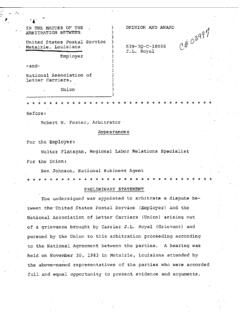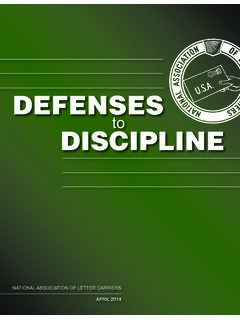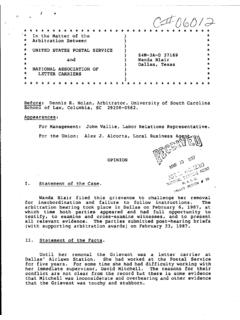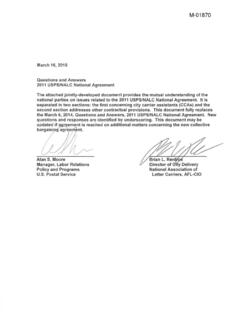Transcription of DEFENSES - National Association of Letter Carriers
1 DEFENSES . to DISCIPLINE. National Association of Letter Carriers april 2014. To All NALC Grievance Handlers Job security is the most important employee guarantee in any collec- tive bargaining agreement. Wages, benefits and work rules mean little without contract language to protect the right to stay employed. Discipline is a grave threat to a Letter carrier's job security. so the National agreement restrains man- agement's disciplinary powers, proclaiming in article that the employer may not discipline or dis- charge an employee unless it can show just cause.. Nalc spends a significant amount of its resources grieving discipline, arguing that management lacks the required just cause. Discipline can accumulate in an employee's personnel file and lead to discharge, so Nalc may grieve to challenge any level of discipline, from a Letter of warning to dis- charge.
2 An Nalc shop steward must research the facts and the contract before constructing an effective dis- cipline grievance. then he or she needs to articulate the correct arguments at the very earliest steps of the grievance procedure. to do these jobs well a shop steward requires deeper and more detailed information than either the National agreement or the Joint contract administration Manual (JcaM). provide. Nalc created this guide to help union representatives find that in-depth information and put it to work challenging discipline. the guide summarizes more than 40 years of Nalc experience with a com- prehensive range of subjects related to discipline. it explains the key principles, contract language, National settlements and arbitration decisions that comprise our own common law of just cause and job security.
3 Sincerely and fraternally, fredric V. rolando president National Association of Letter Carriers 2014 National Association of Letter Carriers , afl-cio DEFENSES to Discipline Table of Contents Table of Contents 3) rule Unenforced introduction 4) long service Navigation tools 5) Not intentional Chapter 1 Forms of Discipline 6) emotionally impaired introduction 7) Drugs alcohol impaired Discussions 8) Grievant was provoked. letters of Warning suspensions 14 days or less Chapter 3 Steward's Role suspensions of more than 14 days or introduction discharge time limits indefinite suspensions investigation rights emergency suspensions information, rights city carrier assistants informal step a Chapter 2 DEFENSES to Discipline formal step a Just cause Duty of fair representation Section 1 Merits Burden of proof Chapter 4 Special Topics evidence election of forums MspB appeal rights Section 2 Management Responsibilities Back pay A) Before issuing Discipline last chance agreements 1) investigate resignations 2) ordered by higher management 3) review and concurrence Chapter 5 Arbitration 4) Denial of Weingarten rights Use of arbitration awards B) concerning Discipline issued Quantum of proof 5)
4 Not progressive 6) Untimely Discipline Chapter 6 Reasons for Discipline 7) improper Basis No rule Broken accidents, in General 8) insufficient or Defective charge accidents, Vehicle 9) improper citation of past elements attendance 10) Double Jeopardy performance related Discipline 11) failure to Give Grievance rights failure to Meet office standards C) During processing Grievance falsification employment application 12) failure to provide, Disclose info Nexus off Duty Misconduct 13) lacked authority to settle Workers'compensation fraud 14) failure to Meet or issue proper Decision Appendix Arbitrator Daugherty Just Section 3 Mitigation Cause . 1) improper training 2) Disparate treatment Index 1. Navigating around the publication the written text of this publication is one-hundred and fifty pages.
5 If necessary, it can be printed out, in whole or in part. However, it has been published as a DVD since its real value is that it contains imbedded hyperlinks to assist navigating around the document and to access more than 500 arbitra- tion awards, National level settlements, court cases and Nalc publications totaling over 10,000. pages. to navigate around the document itself, it is usually best to go to the table of contents at the top and simply left click on the section you are seeking. the links in green will take you to another section of the document, for example: Nexus. the links in blue will take you to an external document in pDf format such as an arbitration award, National level settlement, or article in an Nalc publication, for example: c-23828 , M-01444 or Nalc arbitration advocate.
6 Excerpts from the 2006-2011 National Agreement are indicated by gray shading. Excerpts from the 2009 Joint Contract Administration Manual (JCAM) are indented and indicated by blue shading. Using the Adobe Acrobat Reader this publication and all the linked documents are in adobe acrobat format. Using adobe tools you can search the individual documents and cut and paste text for use in a word processing document. Users should modify the adobe tools found at the top of each page as it is displayed. for example the next page, previous page, previous view, first page, last page, go to page, search, and block tools can all be very helpful. It is especially important to have the next page, and previous page, commands. they will allow you to return to where you left off in this document after you have viewed an external pDf file such as an arbitration award.
7 To add commands, go to the customize toolbars menu under tools at the top of each page. for additional help using pDf documents, con- sult the adobe reader's help files. Note to Readers this publication is based on many previous Nalc publications. it summarizes years of experience by Nalc officers, National Business agents, staff, arbitration advocates and grievance handlers. it will never be complete and we expect it to continue to grow and improve. You can help us improve future editions by bringing any suggestions you have to the attention of the Nalc contract administration Unit. the suggestions can be as simple as reporting typographical errors or broken hyperlinks. However, we would especially welcome your suggestions for additional arbitration awards to include, additional subjects to cover or sections that can be improved, clarified or expanded.
8 2. Chapter 1 Forms of Discipline article 3, section B of the National agreement gives management the right to suspend, demote, dis- charge, or take other disciplinary action against such employees. this general right to issue disci- pline is subject to the more specific provisions of article 16. article 16, section 1 establishes the principles of just cause and progressive discipline which are the subject of chapter 2, below. this chapter reviews the provisions of article 16, sections 2 8 which establish the authorized forms of dis- cipline. occasionally, local managers use unauthorized and prohibited methods to discipline employees. a commonly used unauthorized method is issuing letters of concern, letters of instruction and the like. they are typically used by supervisors in an attempt to establish a paper record as the basis of further discipline.
9 The postal service has repeatedly agreed that all such letters are prohibited. see M-00074, M-00387, M-00389, M-00390, M-00768, M-00706 and M-00912. if supervisors need to ad- dress minor performance problems or irregularities, article 16 authorizes only two methods. they may hold a private, non-disciplinary discussion with an employee (see article 16, section 2) or they may issue official discipline in the form of a Letter of warning, subject to challenge through the grievance/arbitration procedure (see article 16, section 3). 1) Discussions Discussions, occasionally referred to as official discussions or job discussions are the subject of article 16, section 2 which provides the following: Article 16, Section 2. Discussion For minor offenses by an employee, management has a responsibility to discuss such matters with the employee.
10 Discussions of this type shall be held in private between the employee and the supervisor. Such discussions are not considered discipline and are not grievable. Following such discussions, there is no prohibition against the supervisor and/or the employee making a personal notation of the date and subject matter for their own personal record(s). However, no notation or other information pertaining to such discussion shall be included in the employee's personnel folder. While such discussions may not be cited as an element of prior adverse record in any subsequent disciplinary action against an employee, they may be, where relevant and timely, relied upon to establish that employees have been made aware of their obligations and responsibilities. the JcaM explains this section as follows: Although included in Article 16, a discussion is non-disciplinary and thus is not grievable.











